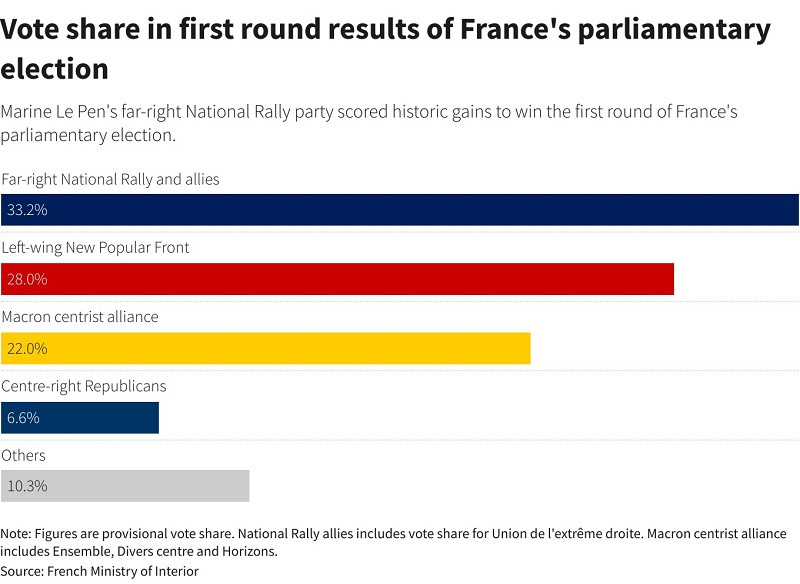PARIS: France’s political parties sought to build a united front aimed at blocking the path to government of Marine Le Pen’s far-right National Rally (RN) on Monday, after it made historic gains to win the first round of a parliamentary election.
The RN and its allies won Sunday’s round with 33% of the vote, followed by a left-wing bloc with 28% and well ahead of President Emmanuel Macron’s broad alliance of centrists, who scored just 22%, official results showed.
While financial markets rallied on relief the RN tally was not greater, it was still a huge setback for Macron, who had called the snap election after his ticket was trounced by the RN in the European Parliament election last month.
“I’m satisfied, because we need change,” said RN supporter Jean-Claude Gaillet, 64, in Le Pen’s northern stronghold of Henin-Beaumont. “Things have not moved, and they must move.”
But others feared the rise of the RN and its nationalist platform would cause growing tensions in French society.
“I don’t think people realise what’s happening, they are only thinking of the cost of living and short-term things like that,” said Yamina Addou outside a supermarket in the nearby town of Oignies, south of Lille. “I find it very sad.”
Whether the anti-immigrant, eurosceptic RN can form a government will depend now on how successfully other parties manage to thwart Le Pen by rallying round the best-placed rival candidates in hundreds of constituencies across France.
Macron was due to plot electoral strategy with senior aides at a meeting at his Elysee Palace later on Monday.

Leaders of both the left-wing New Popular Front and Macron’s centrist alliance indicated on Sunday night they would withdraw their own candidates in districts where another candidate was better placed to beat the RN in next Sunday’s run-off.
However it was not clear whether such a pact would always apply if the left-wing candidate was from the far-left France Unbowed (LFI) party of Jean-Luc Melenchon, one of the main members of the New Popular Front.
Melenchon is one of the most divisive figures in French politics, both enthusing and horrifying voters with his unbridled tax-and-spend proposals and class war rhetoric.
Finance Minister Bruno Le Maire, a Macron party ally, ruled out calling on voters to choose an LFI candidate. “LFI is a danger for the nation”, he told France Inter radio.
Marine Tondelier, a senior member of the ecologist Greens within the left-wing alliance, told the same radio station minutes later she was “absolutely floored” by Le Maire’s stance, calling it “cowardly and privileged”.
Ungovernable?
The RN gains were welcomed by nationalists and far-right groups across Europe, including Italy’s League and Spain’s Vox. Pedro Sanchez, Spain’s Socialist premier, said left-leaning parties could still block an outright RN victory.
Ipsos analyst Mathieu Gallard calculated that the first round had left potential for three-way contests in 306 of the 577 seats to be fought over in France’s National Assembly, underlining the scale of the uncertainty still remaining.
While the so-called “republican front” against the far-right has broadly worked in the past, analysts have questioned whether French voters were still ready to cast their second-round ballots as directed by political leaders.
A longtime pariah for many in France, the RN is now closer to power than it has ever been. Le Pen has sought to clean up the image of a party known for racism and antisemitism, a tactic that has worked amid voter anger at Macron, who is seen by many voters as out of touch with their everyday concerns.
An RN-led government would raise major questions over where the European Union was headed. Human rights groups have raised concerns about how its “France first” policies would apply to ethnic minorities, while economists question whether its hefty spending plans are fully funded.
Banking shares led a surge by French stocks and the premium investors demand for holding the country’s bonds dropped on Monday, while the euro touched a two-week high during Asian trading on Monday on market relief the RN had not done better.
The main alternative scenario to an RN-led government would be a hung parliament potentially making France ungovernable for the remainder of Macron’s presidency due to run until 2027.
In constituencies where no candidate won outright in the first round, the top two candidates, plus any candidate with more than 12.5% of registered voters in that constituency, have until Tuesday evening to confirm whether they will go into the second.
In the manoeuvring after the vote, Prime Minister Gabriel Attal suspended plans for an unemployment reform which would have reduced the jobseekers’ benefits – a move that may make it easier for left-wing voters to back Macron allies.
RN lawmakers meanwhile urged centre-right politicians in the Republicans (LR) party, which received less than 7% of the first-round vote, to withdraw from districts where such a move would work in RN’s favour.
The LR, which split ahead of the vote with a small number of its lawmakers joining the RN, has yet to clarify its stance.
Voter breakdowns showed the left-wing bloc had outperformed the RN in attracting younger voters. Jordan Bardella, the RN’s choice of prime minister if it wins a majority, focused his attacks on left-wing parties, issuing a message on social media describing the far-left as “an existential threat” to France.























